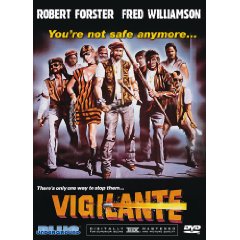 The story of “Vigilante” [1983] starts with Fred “The Hammer” Williamson (“Mean Johnny Barrowsâ€) in an underground room, surrounded by several people. He starts to explain to them that he is sick and tired of being afraid at nights and how they need to take the streets back from the gangs.
The story of “Vigilante” [1983] starts with Fred “The Hammer” Williamson (“Mean Johnny Barrowsâ€) in an underground room, surrounded by several people. He starts to explain to them that he is sick and tired of being afraid at nights and how they need to take the streets back from the gangs.
The tone of the picture is officially set after this one shot.
Soon after, we see for ourselves exactly what Williamson was talking about.
This is the best “Death Wish” rip-off – one which even manages to surpass its inspiration.
What separates “Vigilante” from “Death Wish” is that William Lustig (“Relentless”) directed without concern for the box-office and attempted to see how far he could push the audience, resulting in a no holds barred film that manages to consistently shock its audience.
Simply put, it’s an exploitation masterpiece.
Robert Forster, (“Walking the Edge”), is an Oscar-nominated, underrated B-movie veteran who gives a brave and daring performance in “Vigiliante,†playing Eddie Marino, whose life is ruined after a gang of punks brutally murder his son and severely injure his wife. Although he continues to believe that the system will provide justice, a harsh reality proves just how corrupt society can be.
As stated earlier, Williamson’s character of Nick is sick and tired of seeing the trash run his neighborhood. He knows how unjust the system is and that is why he has taken the law into his own hands. He declares himself early on as “Judge, Jury and Executioner.”
Seeing Williamson distributing his own brand of justice to these punks is a thrilling endeavor. A chase between Nick and a drug dealer through the streets also provides ample thrills; especially because you can rest assured that “The Hammer” will catch him. It’s not until Marino finally decides to team up with him, the streets start to rain with blood.
Williamson seems to be playing himself in the film, but the truth is actually that he has a natural screen presence – and this performance is not nearly as showy as some others.
The supporting cast is also strong. Woody Strode (“Once Upon a Time in the West”) plays Rake, who befriends Marino while he is in prison and becomes his bodyguard. Strode never rose to great success in Hollywood, but has collected a huge list of credits, often playing the strong silent type.
The sleazy and always reliable Joe Spinell (“Maniac,” “Rocky”) plays a smarmy lawyer on the take. His brief appearance is good enough to make you believe he is an actual lawyer.
An apology to all you attorneys out there, but the man virtually oozes professional sliminess.
The real treat of “Vigilante” is that it allows you to be a voyeur in an area you normally wouldn’t want to visit. That mood that the director controls quite nicely allows you to root for the good guys and wish death upon the punks on the streets. No one ever said that the characters were three-dimensional, but the appeal of “Vigilante†isn’t in its ability to provoke a critically thoughtful response – it’s in its ability to make you feel as though you’re there, in this archaic and precarious time and place.
When the camera is on the streets, fear is palpable.
Early scenes set up the uncertainty people risk when walking to the grocery store or coming home from work.  The audience is instantly confused on what to expect, but feels safe once the vigilantes clean up the raw sewage.
Films like these provide good escapism as well. We are allowed to be exposed to the dark side of the world and our very own minds.
However, unlike the very complex and mystifying real life, justice on these factious streets always prevails.

Leave a Reply